Xi Jinping: Chinese leader's surprising ties to rural Iowa
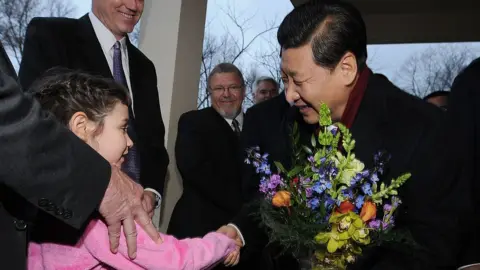 Getty Images
Getty ImagesRick Kimberly still doesn't know quite how the future leader of China ended up visiting his farm outside Des Moines.
In 2012, Xi Jinping was vice-president and on a tour of the US, when he showed a particular interest in agricultural areas.
An advance party made its way to Mr Kimberly's family farm in Iowa, which grows corn and soybeans.
Officials told him that no-one, not even Mr Xi, should climb on to the machinery. "I suppose they were worried someone might slip and fall," he recalls.
But the officials underestimated the hands-on enthusiasm of the most important member of their delegation.
"I saw Mr Xi looking at the John Deere tractor," Mr Kimberly says, "and I asked him if he wanted to climb on.
"Of course he did. We were speaking through a translator, but he even didn't wait for the translation, he understood me right away and went right to the tractor."
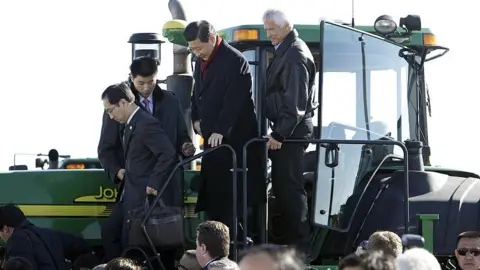 Getty Images
Getty ImagesThe health and safety fears turned out to be unfounded, and Mr Xi was both delighted and uninjured by his ride on farm equipment.
It proved to be another chapter in the Chinese president's curious ties to the largely rural Midwestern state.
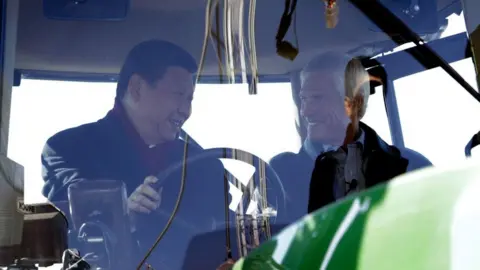 Getty Images
Getty ImagesMr Xi first travelled to Iowa in 1985 as part of an agricultural delegation from China's Hebei province.
He stayed in Muscatine, a city of about 24,000 people circled by farmland and the Mississippi River.
The People's Daily, the Chinese Communist Party's official newspaper, noted that the delegation "visited elderly people in the local community, attended a birthday party, had six interviews with local media outlets and attended five welcome banquets held by the US side".
"I thought he was a very nice, focused, polite man," Eleanor Dvorchak, who hosted Mr Xi at her home during his stay, later told the BBC. "It was a pleasure to have him at the house."
The Dvorchaks put Mr Xi up in their son's bedroom - he was away at college at the University of Iowa at the time. If the Chinese president had an opinion about the room's Star Trek wallpaper, he has managed to keep it to himself.
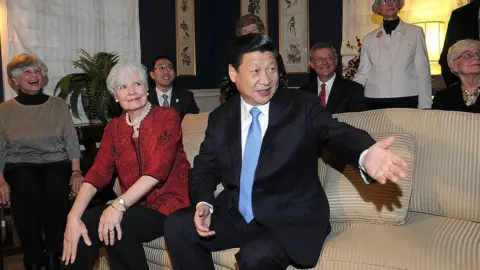 Getty Images
Getty ImagesSome of the Iowans that the future president met during that initial trip are now known in Chinese media as the "old friends".
And while the often frosty relationship between the US and China will be picked apart in minute detail during this week's Apec summit and a meeting between Mr Xi and President Joe Biden, he's sure to receive a warm welcome from several "old friends" who have been invited to a dinner.
As part of his 2012 trip to the state, he returned to Muscatine, and the following year a Chinese businessman bought the Dvorchaks' old house, which for a while was turned into a museum.
Iowa is not on the itinerary this week, but it's expected Mr Xi will also meet with Terry Branstad, a former governor of the state who served as ambassador to China under Donald Trump.
Mr Branstad, who did not respond to a request for an interview, told an Iowa newspaper after leaving the ambassador's post that while he had a warm personal relationship with Mr Xi, he had deep concerns about some of the Chinese government's policies.
"The action they've taken against the people in Hong Kong... [and] mistreatment of the Uyghurs, I think is unconscionable," he told The Gazette in Cedar Rapids.
He also criticised the country's secrecy about the origins of the first Covid-19 outbreak and said: "I really think their system is a real problem."
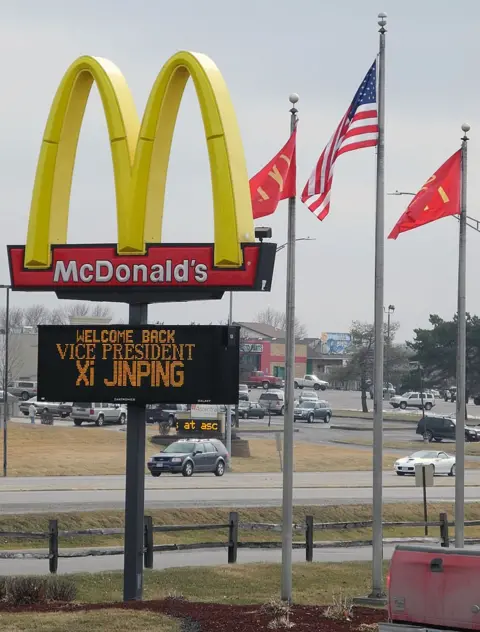 Getty Images
Getty ImagesMr Kimberly, who's now 72 and the fifth generation of his family to farm in Iowa going back to the 1860s, says that back in 2012, the Chinese delegation was interested in more than just a photo op - they asked plenty of questions about the minutiae of modern farming.
And for him personally, the visit was a life-changing event. He was later invited to China and has since travelled to country more than 20 times as part of efforts to boost agricultural development.
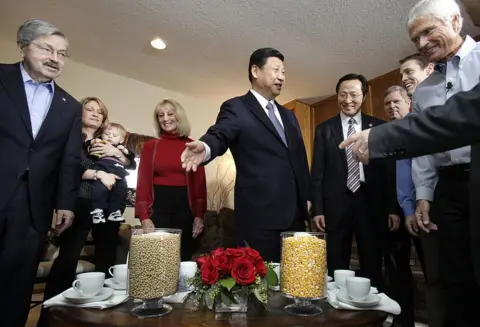 Getty Images
Getty Images"We promote sustainable agriculture and better ways of growing," he says. "We farm 4,000 acres with four people. It's amazing to people in China that you can farm that much land with so few people."
And it also made his farm into something of a tourist attraction. Mr Kimberly says "hundreds if not thousands" of Chinese people have since made the trek to the spot of land where their leader once took a ride on a tractor.
